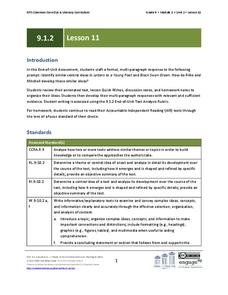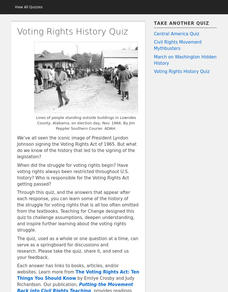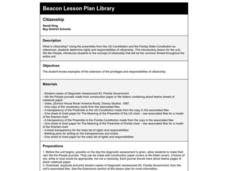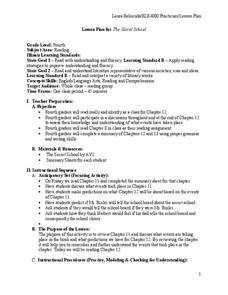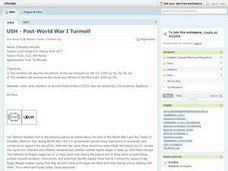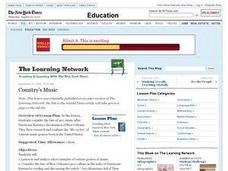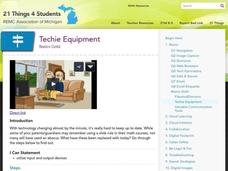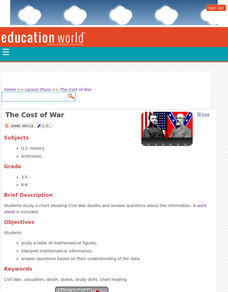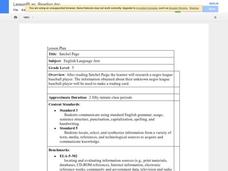EngageNY
Grade 9 ELA Module 1, Unit 2, Lesson 11
As an end-of-unit assessment, class members craft a formal, multi-paragraph essay identifying a similar idea found in Rainer Maria Rilke's collection, Letters to a Young Poet, and David Mitchell's Black Swan Green. Writers state and use...
National Nanotechnology Infrastructure Network
Silver and Bandages: Assessment of Inhibition of Bacteria by Silver Colloid-Impregnated Bandages
Silver: more than jewelry, it's also a natural antimicrobial agent. An inquiry-based lesson asks collaborative groups to design and implement an experiment to test this property. Using samples of silver nanoparticles and a strain of...
Teaching for Change
Voting Rights History Quiz
An 11-question online quiz permits young historians to check their knowledge of the history of voting rights in the United States. After reading a short introduction, individuals click through the questions that test their knowledge of...
Curated OER
President's Day
First graders imagine that they are the President of the United States. In this history activity the students think of three rules or laws that they would create if they were President. The students listen to a book about George...
Curated OER
Traveling with Flat Stanley
students use the internet to gather geographical data about a state of their choice. Using new vocabulary, they describe the features present in the state, its climate and attractions. They develop a PowerPoint presentation to share...
Curated OER
The U.S. Constitution
Students explain the differences between the three branches of government. Using the structure of a democracy, they listen to text about the United States Constitution. They discover how their government affects their lives in negative...
Curated OER
Citizenship
Fifth graders read the preamble of the U.S. and Florida Constitutions. They discuss vocabulary definitions surrounding the concept of citizenship. They discuss and write about the rights and responsibilities of citizens and apply their...
Curated OER
Sweet Potato Pie Goes Fast
Students practice their reading fluency by covering up parts of words in order to identify word they do not know, and by completing repeated readings. They read "Sweet Potato Pie" with a reading partner who times them and records the...
Curated OER
Wood
Students practice reading comprehension strategies. In this literacy and science lesson, students read a non-fiction article about wood and locate main ideas and details. Students construct a card game using information taken from the text.
Curated OER
Reading and Writing Program Using Core Knowledge Literature
Students improve their reading and writing skills using Step Up to Writing and Six Traits of Writing techniques. Students complete a Robinson Crusoe vocabulary crossword, a Treasure Island character analysis web, reading comprehension...
Curated OER
The Secret School
Fourth graders read THe Secret School. In this language arts instructional activity, 4th graders make predictions prior to reading and discussing the story. Students write a summary of the chapter.
Curated OER
Cultural Lit. 31: The U.S. and Iroquois Constitutions
Students identify and compare major elements of Iroquois and United States Constitutions.
Curated OER
Government
Students evaluate how the United States government has maintained a balance between protecting rights and maintaining order. They analyze the impact of Supreme Court decisions on governmental powers and the rights and responsibilities of...
Curated OER
1th Grade U.S. History from 1877
Eleventh graders engage in a lesson that is about the study of history in the United States after the end of World War I. They conduct research using a variety of resources and then summaries are written to explain the reasons for The...
Curated OER
Water and Ice
Students explore the physical properties of water. In this water lesson, students observe, measure, and describe water as it changes state. There are 2 extensions for this lesson that one can access via the Internet links provided.
Curated OER
Jubal's Wish
Students discuss the story "Jubal's Wish." In this literature lesson, students take turns making predictions about what will happen next in the story and state their own wish by taking turns as well.
Curated OER
Country's Music
Jazz, Blue Grass, Hip Hop, Swing. Gospel, R&B, Ragtime, Disco. So many music genres born in the USA. After reading an article about the fate of New Orlean's Jazz after Hurricane Katrina, class members investigate the life cycles of...
Federal Reserve Bank
Your Budget Plan
What do Whoosh and Jet Stream have in common? They are both characters in a fantastic game designed to help students identify various positive and negative spending behaviors. Through an engaging activity, worksheets, and discussion,...
Digital History
The Crisis of 1833: Tariffs and Nullification
This resource offers a detailed review of the events that led South Carolina to nullify the Tariffs of 1828 and 1832, as well as to pass the Nullification Ordinance, which questioned the federal government's authority to enforce any law...
Curated OER
The Cost of War
Students study a chart showing Civil War deaths and answer questions about the information.
Curated OER
Satchel Page
Bring a instructional activity about Negro League Baseball to your Black history unit, or any other research unit throughout the year. While the lesson plan itself is simplistic, there are several good ideas that you could use, such as...
The Digits
Telling Time: The Digits
Time to teach your students how to read a clock? This resource is here to help! Engaging young mathematicians with two fun videos and a series of hands-on activities, these lessons offer a multimedia approach to teaching this important...
Garden of Praise
George Washington Carver Test
This is a standard multiple-choice assessment on the life and ideas of George Washington Carver. It includes 20 questions on topics covering information about his birth and education, major career moves, teaching principles, ethics, etc.
Teach-nology
Author's Purpose
Challenge your class to find the three purposes for writing. After they read three short passages, kids note whether the author's purpose was to inform, persuade, or entertain.


